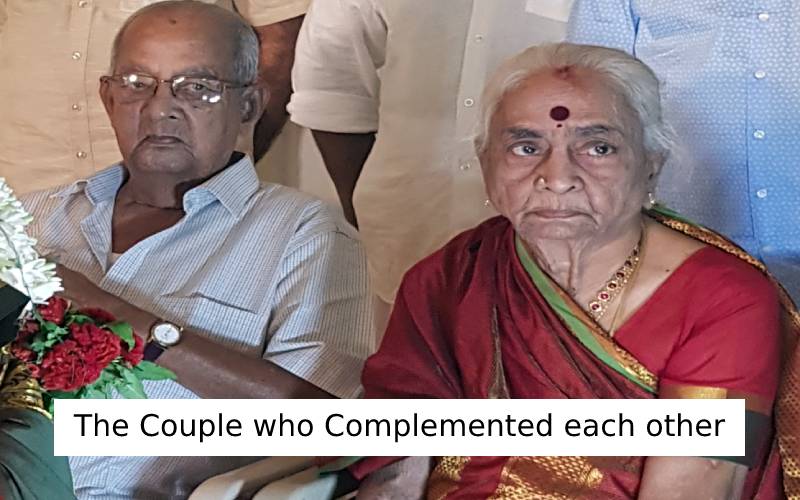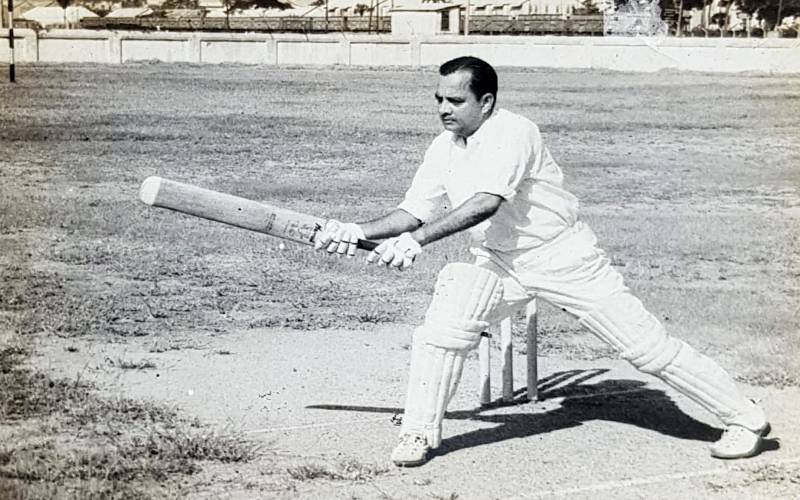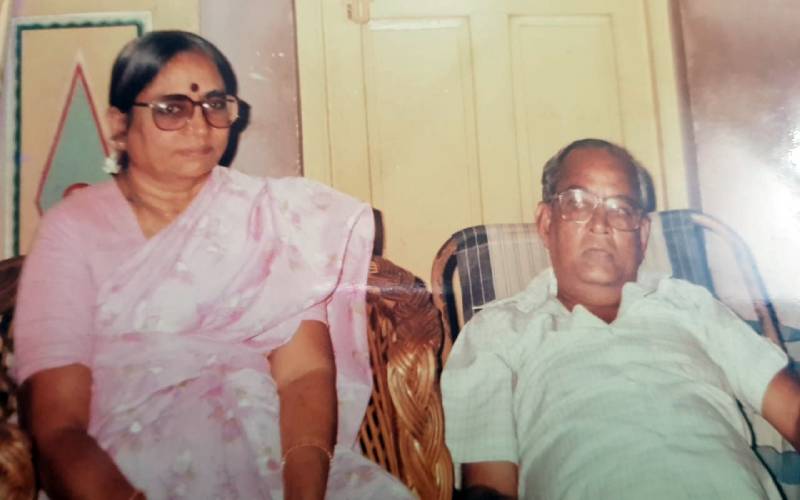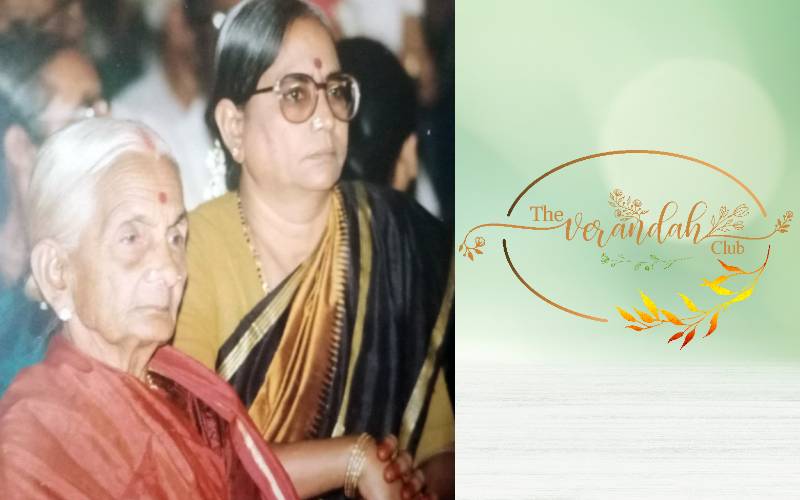
‘Thaiyalnayagi’ was the real name of Visalakshi. She had been thus named after the consort of Lord Vaideeswaran at Mayiladuthurai (Mayavaram). Visalakshi (1938 - 2021) got married to S. Rajagopalan (1930 - 2021) in 1958 and the couple lived together for a long time. She was a kind homemaker and was very accommodative. Visalakshi was known for her good heart. She would bless everyone, and the coffee made by her was savoured by far too many people. The humble lady wanted to do good for everyone. She was keen to pass away as a Sumangali. Visalakshi would fast on all Sankatahara Chaturthi-s (a ritual connected with Lord Ganesha, and it was said to alleviate people from misery). She had done it for decades. Her frequent migraine issues did not deter her from taking up the fast. She would partake salt-free food on Saturdays and Ekadashi-s for several years.
“Mother would fast for a day in the interest of any sick relative. This was her offering to God in order to see them recover. Mother will make Kozhukattai-s (Modhakam) and offer it to Lord Ganapathi. This was her way of requesting and thanking the Almighty. Mother did it selflessly to see that her sick relatives recovered quickly due to the grace of Lord Ganapathi. My wife Srividya began to make Kozhukattai-s on her request and offered it to God. This would happen once a week or even twice. Interestingly, my mother was living in Chennai, and we live in Coimbatore. However, the offering was made as per my mother's wish. She was a very helpful lady. Mother would participate in all the temple occasions in the neighbourhood. Every person, irrespective of caste or creed, would get to enjoy the coffee made by her. Thousands had enjoyed her hospitality,” stated Raghuraman, the paper industry expert. Raghuraman had worked with a number of leading paper manufacturing companies in India and the Middle East before settling down in Coimbatore. His wife, Srividya is a Lotus expert and is a leader in her field.
Visalakshi's husband, Rajagopalan was born to Swaminathan and Chellammal. Swaminathan had been a landlord in Kodangudi village near Mayiladuthurai. The family had moved to Chennai in 1948. This was done in order to facilitate education for the next generation. S. Rajagopalan did his B. Sc. in Physics at Presidency College. He had seen the tramways in Chennai. He worked hard to come up in life. The cricketer was absorbed into Burmah Shell by one, Fowler. Companies would employ people for six months and then remove them from service. They would be appointed once again after a break of week or so. This was done until the management was sure of recruiting the person. Rajagopalan was permanently recruited in about 2 years or so. He played for the Burmah Shell Cricket Team and M. J. Gopalan had been the Captain of the Indian team.

Rajagopalan was deeply attached to Chennai and Cricket. Therefore, he stayed away from promotions and transfers all through his career. Prime Minister, Indira Gandhi had nationalised the foreign businesses. Burmah Shell got nationalised and Rajagopalan was given an opportunity to work from Iraq or Iran. But his love for Cricket and Chennai made him stay back in India. “Appa (Father) had played for the Presidency College. His love for Cricket landed him in Burmah Shell. He along with Gemini Krishnamurthy and Vanchinathan Uncle had their own team comrades which was in the second division of TNCA League. Appa was a Member of Tamil Nadu Cricket Association at the time when B. Sriram was the Secretary and Annadurai happened to be the Assistant Secretary.
He had served in several committees and sub-committees. Appa used to be in the organising committee during several events - Duleep Trophy, Ranji Trophy, Test Matches etc. He had interacted with luminaries like M. A. K. Pataudi, M. L. Jaisimha, Abid Ali, E. A. S. Prasanna, B. S. Chandrashekhar, Faroukh Engineer, Clive Lloyd, Vanburn Holder, to name a few. V. V. Kumar, Venkataraghavan, Belliyappa were well-known to him. Appa had served as an Umpire too. His organising capacity was well known. He would take care of the hotel arrangement (Connemara, Adayar Gate), logistics etc. Appa would also provide volunteers for practice sessions. He would help people get passes. His contacts in the Cricket World were many. He would always catch up on the game with his friends and much of his time was spent watching matches,” stated Raghuraman.
Moving over to Venkateshwara Colony in Madhavaram brought in a whiff of change for Rajagopalan. He began to cultivate roses and he also set up a kitchen garden at home. Rajagopalan had several varieties of roses and he tended them well. His collection included prize winning roses like Russel Delight, Queen Elizabeth, Victoria Pride, and many more. He would enrich his collection at the time of the Ooty Flower Show. Tanker drivers were instructed to buy rose plants. At one time, he had 100 rose plants. Rare varieties like Black Rose, Blue, and Green Rose were in his garden. Summers were hot in Chennai. Therefore, Rajagopalan put up coconut leaf pandals to protect his rose plants. He would water them regularly. Rajagopalan would buy horse dung from a horse stable at Moolakadai, cow dung was got from the nearby Kaliappan, Veppam Punnakku, Ellu Punnakku, Kadalai Punnakku (base - Neem, Gingelly, groundnut respectively). This was given in a combination every three months. His son, Raghuraman and daughter-in-law, Srividya got him 100 rose plants while returning from their honeymoon when they had been to Ooty. This had been the happiest day in the life of Rajagopalan.
“The entire neighbourhood would seek his roses, but Appa would give none of it. He would never let people cut the flowers. Mother would give them roses after he left to work. His mother, Chellammal had a nice kitchen garden too. They used to grow Snake gourd, Bitter gourd, Broad beans, Cluster beans etc. This was way back in 1976/77. It was a time when people never thought of terrace gardens. He was a pioneer in many ways. Appa was active all his life. He ran a typewriting centre along with his mentor cum friend Krishnamurthy. He used to visit the office regularly. Well, now I must talk about his blue, green, and black roses. The blood red roses would become black in two days,” smiled Raghuraman.

Rajagopalan had led an honest life and was known to be sincere in his work. His impeccable memory came in handy. He would know by-heart about the consumption in every fuel station belonging to BPCL (Bharat Petroleum) in the territory concerned with him. Rajagopalan stayed away from controversy. He was known for his legendary Cricket knowledge. The game was his life breath. Several of his juniors and colleagues grew in the organisation. Rajagopalan's love for his city and the game stood first. Otherwise, he would have become a noteworthy personality in the oil industry.
The kitchen cum rose garden pioneer was also famous for his mango distribution. Rajagopalan's residence used to be known for the wafting fragrance of jackfruits and mangoes. His mother, Chellammal used to open the fruit, take the pieces, remove the seeds, add honey and ghee within it to give it to the kids at home. She would first make a small incision to check out the eat worthiness of the fruit. Oil was rubbed in the hands before cutting the jackfruit. These fruits came from Panruti. The ladies would boil the Jackfruit seed and use it. The seed was used in Sambar too. It was also flame heated, spiced and eaten.

Raghuraman spoke about Madhavaram and Mambazham (Mangoes). “It must have been the summer of 1978. One, BPCL tanker driver got us a basket of mangoes on his return from Salem. Appa paid for it and took it inside. Thereafter, a couple of oil tanker drivers used to get us mangoes and our house would be filled with mango baskets. Appa would always pay for the mangoes. More than 100 baskets of Neelam, Rumani, Imampasand, Malgova, Nedusalai, Alphonso, Padiri would arrive. They would be distributed. My mother and grandmother loved mangoes. Padiri would be green from outside and red inside. It would normally arrive at the end of the annual season. The variety, Rumani would be almost round. Appa and his mother liked Padiri mangoes. We used to eat Moru Saadham (butter milk and rice) with Chellamma Avakkai (One type of mango pickle and named after our paternal grandmother). Maavadu, was consumed and grandmother, Chellamma made Mambalam Rasam (Boiled mango extracts with spices) and Pachadi. All of us loved the fruits. Those were fabulous days.”
Visalakshi left the world a few days before her husband Rajagopalan. This had happened as per her wish. The couple were greatly attached to each other. They played a complementary role. Such people nourished families happily while also praying for the well-being of others through abstinence and sacrifice. Visalakshi and Rajagopalan led a life which is worthy of emulation.
Mr. Rajesh Govindarajulu is one of the founding members of the Verandah Club Pvt. Ltd. He is a leading columnist, historian, jeweler, and entrepreneur. He is a heritage enthusiast who is earnestly working to revive the past in the light of the present. Experiential learning about the history of Coimbatore is his main course of interest and he is also a panel member of many colleges in the city.
NEXT ARTICLE